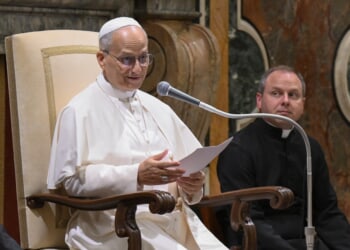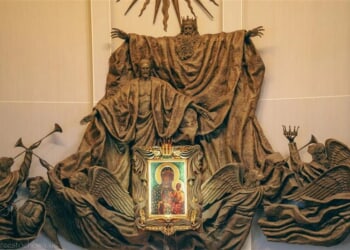The Middle East is more Muslim than ever.
In 1900, 14 percent of the Middle Eastern population was Christian. After genocide and mass emigration, Christians now stand at 4 percent of the population. Other minority groups have suffered from similar campaigns and made the choice of extermination or exodus.
This is not just a historical event, but an ongoing phenomenon reshaping the region’s politics.
No Nation Secure
Examples of war driving out Christians abound across the Middle East.
Lebanon was founded as a state centered on the Arabic-speaking Catholic population in and around the mountainous region surrounding the city of Beirut. Lebanese Christians have engaged in a gradual exodus that hit a high point during the 1975-1990 Lebanese Civil War, where religious massacres claimed thousands of lives. Since the 1940s, Christians have gone from nearly 60 percent of the Lebanese population to approximately 30 percent.
Once in the West, Middle Eastern Christians have been astounded to find that open borders policies and woke ideology run amok meant persecution followed them.
The 2003 invasion of Iraq opened the way for a power vacuum that is often filled by Islamic extremist groups. In response, over a million Christians left Iraq, primarily members of the Assyrian-Chaldean minority. Adherents of the Assyrian Church of the East and Chaldean Catholic Church, an Eastern church fully bound to the Vatican, they speak a dialect of the Aramaic language once spoken by Jesus.
Following the 2013 Egyptian Revolution, supporters of the Muslim Brotherhood targeted Egyptian Coptic Christians en masse. Mobs burned churches, homes, and Christian-owned businesses. The Vatican made history in 2023 by canonizing 21 members of the Coptic Orthodox Church murdered for their faith by ISIS insurgents as saints.
Egypt’s government has consistently sided against its minorities. The killing of Copts persists, prompting President Donald Trump to issue a proclamation for Global Coptic Day on June 1, 2025. It denounced the “vicious and ongoing persecution” of Coptic Christians and praised the resilience of their communities in Egypt and the diaspora.
Christians are not the only minority groups to have suffered. A century ago, 25 percent of Baghdad’s population was made up of Jews. Now, there are four Jews left in the entire country of Iraq, the vast majority of the community having to face the choice of pogroms or escape to Israel.
The Mandaean community of Iraq and Iran reveres John the Baptist as their messiah and existed in some form in the region’s marshes for 2,000 years. Islamic violence after 2003 led to a mass departure of their population, leaving only a few thousand left in their homeland. These remnants must still protect the graves of their ancestors from Muslim extremists.
Countless Christians have found a better life in the New World. Until the 2010s, 63 percent of Arab-Americans were Christians. Up to two million Latin Americans can also claim ancestry from Christian Arabs, mostly Lebanese Catholics, according to some estimates
Most Targeted, Least Helped in the Middle East
At Syria’s independence from France in 1946, 14 percent of its population was Christian. It had fallen to 10 percent by the beginning of the Syrian Civil War in 2013. Islamic extremist groups engaged in a systematic campaign of forced conversion and murder against religious minorities that continues with the new regime. Current estimates put the Christian proportion at 2 percent, a drop from 1.5 million to 300,000 between 2011 and 2025.
Syrian Christians were disproportionately likely to flee their country and become refugees in the wake of religious violence and Islamic terrorism. Yet, despite their higher likelihood of integration in the U.S. and the unique dangers they faced, they were less likely to be resettled by refugee agencies. Out of 10,801 Syrian refugees accepted by America in 2016, only 56 individuals, barely half a percent of the total, were Christian.
The explanation for this abandonment is that the United States and Europe relied upon the United Nations High Commission for Refugees for resettlement. The organization forced Christian refugees into camps with Muslim refugees, riddled with infiltration by ISIS and murderous gangs. Christians were subject to kidnapping and slaughter.
The United Nations guards themselves participated in the discrimination. Paul Diamond, an attorney who unsuccessfully sued Britain’s government in 2019 for favoring Muslim refugees told the Christian Broadcasting Network about people whose families had been murdered but “[couldn’t] even get into the U.N. camps to get the food.” In his telling, if “you say I am a Christian or convert, the Muslim U.N. guards will block you … even threaten you.”
Thousands of Syrian Christians thus had no choice but to flee a second time from these camps. Many went to protected church-run refugee centers. Refugees under church stewardship were excluded from Western immigration policies, leaving the Sunni Muslim population the almost sole beneficiaries of American and European open arms.
A Fallen West
Once in the West, Middle Eastern Christians have been astounded to find that open borders policies and woke ideology run amok meant persecution followed them.
One Afghan convert to Christianity was murdered in Germany while her children watched. The aftermath of the incident saw German pastors ringing alarm bells as law-abiding refugee Christians they helped integrate into society were met with graffiti promising to “kill the non-believers” from local Muslim separatist groups.
Muslims are often folded into left-wing notions of inclusion and intersectionality, but Christian refugees have no such luck. One Iranian Christian in Sweden told the Christian Broadcasting Network that he felt militant atheists were actively biased against Christians. Having turned against the faith in their homeland, Swedish officials regarded his sincerity as “completely alien.”
A similar phenomena was witnessed earlier this month as the Supreme Court heard oral arguments in Mahmoud v. Taylor. The case pits a mix of Christian and Muslim parents against Maryland schools that made their 4-year-old children read books about LGBT issues.
The initial attempt to raise the issue with the Montgomery County School Board was led by Ethiopian Orthodox Christian families. The uniformly Democratic school board responded by denouncing the African refugees as “racist xenophobes and white supremacists.”
The Importance of a Christian Population
Cardinal Bechara Raï, Patriarch of the Maronite Catholic Church to which most Lebanese Christians belong, argues that Christians are a decisive “moderating factor” in maintaining Middle Eastern stability. He believes that Muslims are less likely to veer into extremism when living with neighbors of other faiths, predicting that “if the Middle East is emptied of Christians, Muslims will lose their moderation.”
Cardinal Raï cautioned that the exodus of Middle Eastern Christians would likely continue unless positive and proactive steps were taken by Middle Eastern governments to recognize their Christian minorities and include them in the governing process. The Maronite leader implored Christians to choose the fight at home over flight abroad.
Evidence seems to affirm his claim of Christians serving as a key moderating influence.
Palestinian Christians are far more likely to denounce Hamas attacks on Israel and, unlike most Palestinian Muslims, do not generally deny the historic presence of Jews. Israel has served as a beacon of hope for Christians across the region, including Palestinians facing threats from both the outwardly Islamist Hamas and the ostensibly secular Palestinian Authority.
The Assyrian Church of the East and Chaldean Catholic Church have played a lead role in talks surrounding autonomy for Kurds with the goal of securing rights for minorities that include Christians but also adherents of the non-Muslim Yazidi religion.
The Greek Orthodox Church, which can boast over four million Arab adherents, touted itself as a possible mediator in dialogues toward peace in Syria. Pierbatista Pizzaballa, the Latin Patriarch of Jerusalem, offered himself as a prisoner for Hamas if only they would free the Israeli children they had taken hostage on Oct. 7.
With direct confrontation between Iran and Israel bursting onto the global scene, the role of Christians in the land where their faith began today may be more crucial than ever.
Shiv Parihar is an editorial intern at The American Spectator, you can follow him on X @ShivomMParihar.
READ MORE from Shiv Parihar:
Exclusive: Anti-Regime Iranians Speak Out, Discuss Widespread Discontent With the Mullahs’ Rule
Syriac Christians Mark 110 Years Since Genocide


![Former Bravo Star Charged After Violent Assault Using a Rock-Filled Sock in Tennessee Walmart [WATCH]](https://www.right2024.com/wp-content/uploads/2025/07/Former-Bravo-Star-Charged-After-Violent-Assault-Using-a-Rock-Filled-350x250.jpg)



![Man Arrested After Screaming at Senators During Big Beautiful Bill Debate [WATCH]](https://www.right2024.com/wp-content/uploads/2025/06/Man-Arrested-After-Screaming-at-Senators-During-Big-Beautiful-Bill-350x250.jpg)










